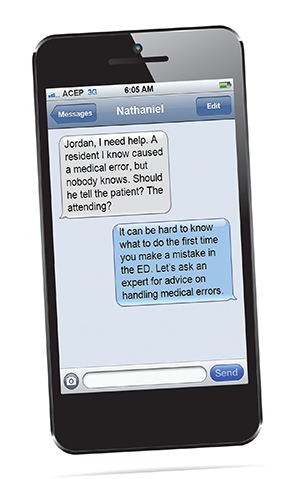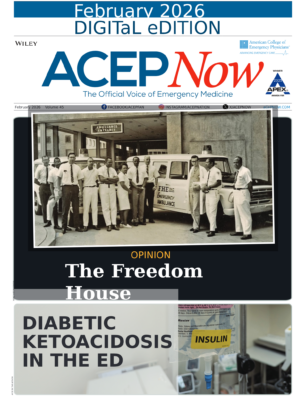Error in judgment must occur in the practice of an art which consists largely of balancing probabilities.—William Osler
Explore This Issue
ACEP Now: Vol 35 – No 04 – April 2016
Nathaniel Mann, MD, is a resident in the department of emergency medicine at the University of Cincinnati in Ohio. Jordan Celeste, MD, is an emergency physician in Florida.
As emergency physicians, we strive for perfection. We strive for quality medical care, diagnostic accuracy, patient safety, and patient satisfaction. However, medical errors are an inevitable reality in the practice of medicine. We focus attention on education and systems to reduce the incidence of medical errors and to manage outcomes after a medical error. Increased attention to medical errors resulted from the Institute of Medicine landmark report “To Err Is Human: Building a Safer Health System” in 2000.1 In this report, an error is defined as failure of a planned action to be completed as intended (error of execution) or use of a wrong plan to achieve an aim (error of planning). Errors may be classified as serious errors (errors that cause permanent injury or transient but potentially life-threatening harm), minor errors (errors that cause harm that is neither permanent or potentially life-threatening), and near-miss errors (errors that could have caused harm but did not either by chance or by timely intervention).
Errors occur commonly in the ED environment.2–4 A recent study showed that 56 percent of U.S. physicians have been involved with a serious error, 74 percent have been involved with a minor error, and 66 percent have been involved with a near-miss error.5
Patients strongly prefer disclosure of medical errors (up to 98 percent of patients).6–8 It has been demonstrated that disclosure of errors to patients resulted in increased patient satisfaction, reduced likelihood of changing physicians, lower rate of seeking legal advice, reduced litigation, lower legal expenses, and lower jury awards.7,9,10 At least 35 states have adopted apology/disclosure laws, which protect providers who disclose medical errors.
According to the American Medical Association ethics opinion “Ethical Responsibility to Study and Prevent Error and Harm,” “physicians must strive to ensure patient safety and should play a central role in identifying, reducing, and preventing health care errors.”11 Physicians should be active in error reporting and disclosure to patients, but they should do so in collaboration with hospital risk management. In addition, The Joint Commission has required multiple safety standards including requirements of attention to safety, staff safety education, reporting systems, and disclosure of errors.
 Dr. Marco is professor of emergency medicine at Wright State University Boonshoft School of Medicine in Dayton, Ohio.
Dr. Marco is professor of emergency medicine at Wright State University Boonshoft School of Medicine in Dayton, Ohio.
References
- Kohn LT, Corrigan JM, Donaldson MS, eds. To err is human: building a safer health system. Washington, DC: National Academy Press; 2000.
- Fordyce J, Blank FS, Pekow P, et al. Errors in a busy emergency department. Ann Emerg Med. 2003;42:324-333.
- Croskerry P, Sinclair D. Emergency medicine: a practice prone to error? CJEM. 2001;3:271-276.
- Kuhn GJ. Diagnostic errors. Acad Emerg Med. 2002;9(7):740-750.
- Garbutt J, Waterman AD, Kapp JM, et al. Lost opportunities: how physicians communicate about medical errors. Health Aff (Millwood). 2008;27(1):246-255.
- Hobgood C, Tamayo-Sarver JH, Weiner B. Patient race/ethnicity, age, gender and education are not related to preference for or response to disclosure. Qual Saf Health Care. 2008;17(1):65-70.
- Mazor KM, Simon SR, Yood RA, et al. Health plan members’ views about disclosure of medical errors. Ann Intern Med. 2004;140:409-418.
- Gallagher TH, Waterman AD, Ebers AG, et al. Patients’ and physicians’ attitudes regarding the disclosure of medical errors. JAMA. 2003;289:1001-1007.
- Gallagher TH, Studdert D, Levinson W. Disclosing harmful medical errors to patients. N Engl J Med. 2007;356:2713-2719.
- Boothman RC, Blackwell AC, Campbell DA Jr., et al. A better approach to medical malpractice claims? The University of Michigan experience. J Health Life Sciences Law. 2009;2:125-159.
- Ethical responsibility to study and prevent error and harm. AMA’s Code of Medical Ethics, 2003. Accessed March 15, 2016.
- Disclosure of medical errors. Accessed Jan. 26, 2016.
Pages: 1 2 3 | Multi-Page




One Response to “How to Handle a Medical Mistake”
May 21, 2016
Charles A. Pilcher MD FACEPThis article and the smartphone image need better correlation.
The question is really “How do I tell my patient NOW, in real time, when I just gave him/her the wrong drug/dose – or some other error?”
I suggest that honesty and transparency are needed at all stages of the event. Early, we tell what we know. We apologize. “Sorry” is a good word. We tell what we are doing and why. And we tell what we WILL do. We do not discuss things we don’t know, like why the error happened. That is more complex and requires time, usually through an RCA. We promise to update everyone concerned as soon as we know anything certain. We follow through. And whenever possible, we include the affected patient/family in our process.
Fears of malpractice are overblown. An egregious error will (and in our system probably should) result in litigation/negotiation. Apologizing doesn’t change that and in fact reduces exposure, time, stress and expense.